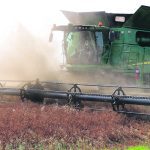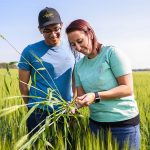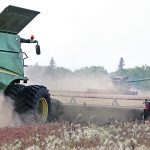The 2024 crop year is the gift that keeps on giving. For many producers in Western Canada, there was a distinct optimism coming out of the seeding window and into the summer months. In fact, right up until mid to late July, even the markets were reacting to what most thought would be a “bumper” […] Read more
Tag Archives Hebert Grain Ventures

Network promotes better farm drainage communication
Farmer-led initiative says producers, public need better information about how to handle too much or too little water
REGINA — A new collaboration in Saskatchewan is meant to improve communication about agricultural water. The Saskatchewan Drainage Extension Network (SK DEN) is a partnership led by farmers and farm organizations who want water better managed. Related story: Landowners struggle with unapproved drainage “When it comes to drainage management and irrigation, I think we have […] Read more
Network aims to share drainage research and innovation
REGINA — A variety of agricultural stakeholders have formed a new provincial drainage research and extension network. The Saskatchewan Farm Stewardship Association, which promotes drainage, announced the network Sept. 10, describing it as a private sector leadership initiative and a collaboration of industry leaders and strategic advisers. The Saskatchewan Drainage Extension Network will be known […] Read more

The next generation: seeking a place on the farm
WINNIPEG — On a hockey team, every player should have a role: a defensive centre, who shuts down the opponent’s star player; or a small but skilled defenceman who anchors the power play. It’s the same in a farm business. Everyone needs a specialty or an important role, but sometimes young people struggle to find […] Read more

Climate change plan needs ‘proportion and perspective’
Glacier FarmMedia – The ag industry has a chance to get a hand on the reins of climate change discussions. That was the takeaway from a panel discussion at the 2024 Canadian Crops Convention in Winnipeg March 6. Kristjan Hebert was the farmer voice on the panel. He is president and chief executive officer of […] Read more

Sask. farmer promotes 10 cents per acre campaign
It’s clear to Kristjan Hebert that farmers aren’t very good at marketing. He’s not talking about marketing crops or livestock — many producers can do that. He says what they lack is the ability, or willingness, to sell farming as a potential career to young Canadians. “Just scroll through social media and you’ll see the […] Read more

Farm, college form partnership
Hebert Grain Ventures has signed a memorandum of understanding with the Olds College of Agriculture & Technology to solidify the two organizations’ efforts to work together to improve innovation and growth in the agriculture industries of Alberta and Saskatchewan. The partnership between the farming company and the post-secondary institution will include joint efforts in farming, […] Read more

Project studies how to measure soil carbon
To get a better handle on how much carbon is stored in soil and how soil carbon is changing over time, researchers from the University of Saskatchewan, the University of Guelph and other institutions are conducting a case study at a 32,000-acre farm near Moosomin, Sask.




